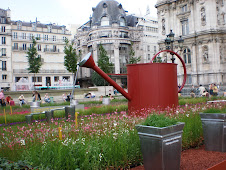So we're framing the research as collecting stories about local adaptations of global technologies to address human issues. Which technologies?
A few areas of technology come to mind.
HOUSING:
The current issue of the Sunday New York Times magazine has an article about architects and refugee camps. In
"The Exigent City" Jim Lewis writes about the challenges of these long term camps - how to design them so they work. He says, " There are almost a billion people worldwide who live in makeshift housing or unplanned communities, off the grid, off the economy, and off the map. Almost everyone I spoke to agreed that whatever solutions there may be will have to start with local knowledge, focusing and magnifying the ingenuity of individual communities rather than applying an architectural fiat from above."
Check out
Open Architecture for ideas and designs.
PUBLIC HEALTH:
How will
lifestraw help provide cheap water filtration around the world?

And how can medical personnel help individuals prevent malaria with more access to mosquito netting, or help
provide drugs for diseases that are used correctly by poor people? US donors are swarming to help
get nets world wide; are their resources really used well. The website
medgadgets documents hundreds of new technologies that will assist in many areas of medicine - but are these accessible, affordable, and aligned with local ways?
ENERGY
Some stories, but dense, in Friends of the Earth International.And from Ashoka, there's a
competition regarding innovations in creating sources of renewable energy!Next - need to get specific!





